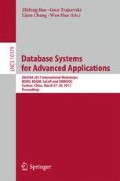Abstract
Over the past few years, massive open online courses (a.b.a MOOCs) has rapidly emerged and popularized as a new style of education paradigm. Despite various features and benefits offered by MOOCs, however, unlike traditional classroom-style education, students enrolled in MOOCs often show a wide variety of motivations, and only quite a small percentage of them participate in the final examinations. To figure out the underlying reasons, in this paper, we make two key contributions. First, we find that being an examinee for a learner is almost a necessary condition of earning a certificate and hence investigation of the examinee rate prediction is of great importance. Second, after conducting extensive investigation of participants’ operation behaviours, we carefully select a set of features that are closely reflect participants’ learning behaviours. We apply existing commonly used classifiers over three online courses, generously provided by China University MOOC platform, to evaluate the effectiveness of the used features. Based on our experiments, we find there does not exist a single classifier that is able to dominate others in all cases, and in many cases, SVN performs the best.
Access this chapter
Tax calculation will be finalised at checkout
Purchases are for personal use only
Notes
- 1.
- 2.
- 3.
- 4.
The performance of SVM is fairly close to that of decision tree in Course B and Course C.
References
Academic & university news — times higher education (the). https://www.timeshighereducation.com/news/mooc-completion-rates-below-7/2003710.article/
China university MOOC. http://www.icourse163.org/
Coursera. https://www.coursera.org
Data driven education workshop. https://nips.cc/Conferences/2013/
edX. https://www.edx.org/
Udacity. https://cn.udacity.com/
XuetangX. http://www.xuetangx.com/
KDD Cup 2015, MOOC dropout prediction. https://biendata.com/competition/kddcup2015/
Amnueypornsakul, B., Bhat, S., Chinprutthiwong, P.: Predicting attrition along the way: the UIUC model. In: Empirical Methods in Natural Language Processing Workshop on Modeling Large Scale Social Interaction in Massively Open Online Courses (2014)
Cristianini, N., Shawe-Taylor, J.: An Introduction to Support Vector Machines and Other Kernel-Based Learning Methods. Cambridge University Press, Cambridge (2010)
The Free Encyclopedia, Massive open online course. https://en.wikipedia.org/w/index.php?title=Massive_open_online_course&oldid=694372484/
Fei, M., Yeung, D.: Temporal models for predicting student dropout in massive open online courses. In: IEEE International Conference on Data Mining Workshop, pp. 256–263 (2015)
Freedman, D. (ed.): Statistical Models Theory and Practice. Cambridge University Press, Cambridge (2009)
Kloft, M., Stiehler, F., Zheng, Z., Pinkwart, N.: Predicting MOOC dropout over weeks using machine learning methods. In: Empirical Methods in Natural Language Processing Workshop on Modeling Large Scale Social Interaction in Massively Open Online Courses (2014)
Luaces, O., Díez, J., Alonso-Betanzos, A., Lora, A.T., Bahamonde, A.: A factorization approach to evaluate open-response assignments in moocs using preference learning on peer assessments. Knowl.-Based Syst. 85, 322–328 (2015)
Manhães, L.M.B., da Cruz, S.M.S., Zimbrão, G.: WAVE: an architecture for predicting dropout in undergraduate courses using EDM. In: Symposium on Applied Computing, pp. 243–247 (2014)
Nesterko, S.O., Seaton, D.T., Reich, J., McIntyre, J., Han, Q., Chuang, I.L., Ho, A.D.: Due dates in MOOCs: does stricter mean better? In: First (2014) ACM Conference on Learning @ Scale, L@S 2014, Atlanta, GA, USA, 4–5 March 2014, pp. 193–194 (2014)
Qiu, J., Tang, J., Liu, T.X., Gong, J., Zhang, C., Zhang, Q., Xue, Y.: Modeling and predicting learning behavior in MOOCs. In: Proceedings of the Ninth ACM International Conference on Web Search and Data Mining, pp. 93–102 (2016)
Ramesh, A., Goldwasser, D., Huang, B., Daumé III., H., Getoor, L.: Learning latent engagement patterns of students in online courses. In: Proceedings of the Twenty-Eighth AAAI Conference on Artificial Intelligence, 27–31 July 2014, Québec City, Québec, Canada, pp. 1272–1278 (2014)
Shah, N.B., Bradley, J., Parekh, A., Wainwright, M.J., Ramchandran, K.: A case for ordinal peer-evaluation in MOOCs. In: Neural Information Processing Systems (NIPS): Workshop on Data Driven Education (2013)
Sharkey, M., Sanders, R.: A process for predicting MOOC attrition (2014)
She, J., Tong, Y., Chen, L.: Utility-aware social event-participant planning. In: SIGMOD 2015, pp. 1629–1643 (2015)
She, J., Tong, Y., Chen, L., Cao, C.C.: Conflict-aware event-participant arrangement and its variant for online setting. IEEE Trans. Knowl. Data Eng. 28(9), 2281–2295 (2016)
Taylor, C., Veeramachaneni, K., O’Reilly, U.: Likely to stop? Predicting stopout in massive open online courses. CoRR, abs/1408.3382 (2014)
Tong, Y., She, J., Ding, B., Chen, L., Wo, T., Xu, K.: Online minimum matching in real-time spatial data: experiments and analysis. PVLDB 9(12), 1053–1064 (2016)
Tong, Y., She, J., Ding, B., Wang, L., Chen, L.: Online mobile micro-task allocation in spatial crowdsourcing. In: ICDE 2016, pp. 49–60 (2016)
Tong, Y., She, J., Meng, R.: Bottleneck-aware arrangement over event-based social networks: the max-min approach. World Wide Web 19(6), 1151–1177 (2016)
Zhuoxuan, J., Yan, Z., Xiaoming, L.: Learning behavior analysis and prediction based on MOOC data. J. Comput. Res. Dev. 52(3), 614–628 (2015)
Acknowledgements
Hong Chen is the corresponding author of this paper. The work in this paper was in part supported by the Fundamental Research Funds for the Central Universities, and the Research Funds of Renmin University of China under No. 297615121721, No. 297616331721, No. 2015-ms007, and No. 15XNLF09. Our experimental environment is in part supported by the National Virtual Experimental Teaching Center on Big Data Aided Comprehensive Training for Liberal Arts and Social Science, Renmin University of China.
Author information
Authors and Affiliations
Corresponding author
Editor information
Editors and Affiliations
Rights and permissions
Copyright information
© 2017 Springer International Publishing AG
About this paper
Cite this paper
Lu, W. et al. (2017). Predicting Student Examinee Rate in Massive Open Online Courses. In: Bao, Z., Trajcevski, G., Chang, L., Hua, W. (eds) Database Systems for Advanced Applications. DASFAA 2017. Lecture Notes in Computer Science(), vol 10179. Springer, Cham. https://doi.org/10.1007/978-3-319-55705-2_27
Download citation
DOI: https://doi.org/10.1007/978-3-319-55705-2_27
Published:
Publisher Name: Springer, Cham
Print ISBN: 978-3-319-55704-5
Online ISBN: 978-3-319-55705-2
eBook Packages: Computer ScienceComputer Science (R0)

